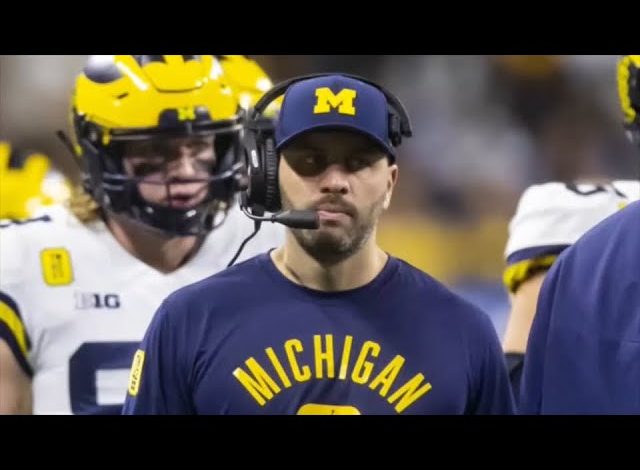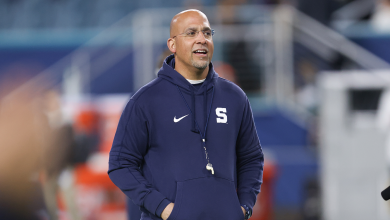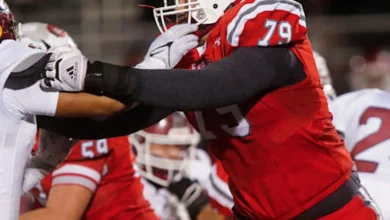University of Michigan lawyers boldly claim Matt Weiss acted alone in data breach, distancing institution from alleged unauthorized access incident.

In the rapidly evolving world of college athletics and institutional integrity, few stories have been as jarring—or as controversial—as the data breach involving former Michigan football co-offensive coordinator Matt Weiss. Now, the University of Michigan has made a striking legal pivot: its lawyers claim Weiss acted entirely on his own, severing institutional ties to the scandal and attempting to insulate the university from potential long-term reputational and legal fallout.
As court proceedings begin to unfold, and new revelations surface, the campus community, fans, alumni, and media are left to process one of the most shocking and complex stories in recent NCAA memory.
The Origins of the Weiss Investigation
The story began quietly but ominously in January 2023, when Weiss was placed on administrative leave due to what was described as “a University of Michigan police investigation into computer access crimes.” Not long after, the university confirmed that Weiss had been terminated.
At the time, little was publicly known beyond speculation. Theories swirled—ranging from internal recruiting violations to tampering with institutional data. But behind closed doors, an extensive digital forensics investigation was already underway.
It wasn’t until months later that the details of the investigation began to trickle into public view: Weiss was allegedly involved in unauthorized access of email accounts belonging to fellow staffers, possibly with the intent to retrieve confidential information. The motives remain speculative, but the allegations were grave enough to prompt federal and university investigations.
A Legal Bombshell: University’s Lawyers Draw the Line
Fast forward to spring 2025: in a high-profile court filing, University of Michigan lawyers submitted a statement distancing the university from the incident, asserting that Matt Weiss “acted independently and without the knowledge, support, or authorization of any University officials or departments.” They further claim the breach was “isolated to the actions of one individual,” and characterized the university itself as a victim, rather than a co-conspirator.
This legal positioning is significant.
By declaring Weiss an isolated actor, Michigan is aiming to protect itself from broader liability, including potential lawsuits from those whose data was accessed, or NCAA sanctions should any of the breach be linked to athletic strategy or recruiting tactics.
Fallout Within the Athletic Department
The immediate impact within Michigan’s storied football program was unavoidable. Although Weiss had already been dismissed, the cloud surrounding the investigation has lingered for over a year. The program’s national championship in 2023—its first since 1997—was supposed to be a triumphant return to dominance. Instead, the celebrations were soon overshadowed by legal uncertainty and reputational damage.
Multiple assistant coaches were interviewed during the investigation, and several staff members had their institutional emails and access credentials reset. Security protocols across the athletic department were tightened.
While no current staff have been implicated, the athletic department has faced scrutiny over its internal cybersecurity practices and oversight.
NCAA and Federal Oversight
The NCAA has, so far, not formally charged Michigan or Weiss with a violation related to the data breach. However, representatives have been monitoring the situation closely. NCAA officials have reportedly requested updates from Michigan’s compliance office and are conducting their own background investigation.
Meanwhile, federal law enforcement agencies are also involved due to the potential crossing of state and institutional boundaries, as well as the involvement of sensitive digital information.
According to cybersecurity experts, if Weiss used university credentials to access private email accounts or systems without permission, it could constitute a federal offense under the Computer Fraud and Abuse Act.
Who is Matt Weiss? A Career Marked by Complexity
Before the scandal, Matt Weiss was seen as a rising star in the world of college football. With a background in analytics and a stint with the Baltimore Ravens under John Harbaugh, Weiss brought an NFL-style offensive mind to Michigan. He was known for being cerebral, forward-thinking, and deeply immersed in the data side of football.
Paired with co-offensive coordinator Sherrone Moore, Weiss helped elevate Michigan’s passing game during their 2022 Big Ten Championship season. But his sudden departure raised eyebrows, and the lack of transparency early on only added to the speculation.
Now, Weiss finds himself not just out of a job, but at the center of a digital ethics and legality firestorm.
The Broader Implications for Universities and Athletics
Michigan’s legal stance—that Weiss acted alone—has sparked debate in higher education and compliance circles.
“Institutions often want to draw a hard line in situations like this,” said a university law professor who specializes in digital privacy. “By isolating the bad actor, they protect the brand. But it raises questions about systemic weaknesses. If one employee can access so much without detection, that’s a red flag.”
Other athletic programs are reportedly reviewing their digital access policies. Some are now implementing additional layers of login security for staff, including multi-factor authentication and restricted access logs for sensitive communication platforms.
In an era where NIL deals, recruiting strategies, and internal program information are guarded like state secrets, the idea of a data breach hitting a major program is deeply unsettling.
Public and Alumni Reaction
The reaction from Michigan fans and alumni has been mixed. While many support the university’s effort to move forward and isolate the issue, others remain skeptical.
“This is a place that prides itself on being ‘Leaders and Best,’” said one alumnus. “It’s hard to reconcile that with something like this, especially with so few answers.”
Students on campus have also voiced concerns about data safety and transparency. A petition circulated in early 2025 called on the university to release a full internal audit of its cybersecurity systems and to publicly disclose any affected accounts.
What’s Next in the Case?
As of now, Matt Weiss has not been formally charged with a crime. However, legal experts suggest that indictments could still come, especially if new digital evidence surfaces.
University officials say they’ve completed their internal investigation, but will cooperate with law enforcement and the NCAA as needed. Weiss’s legal team has remained largely silent, although a representative recently indicated that their client denies any criminal intent and will “vigorously defend against any unfounded allegations.”
The university’s statement to the court may also signal that they anticipate further legal action, possibly from those affected by the breach or from Weiss himself, should he challenge the narrative of acting alone.
A Moment of Reckoning for College Football’s Tech Age
The Michigan-Weiss saga may be a watershed moment in college sports—an era increasingly defined not just by what happens on the field, but by what happens behind the scenes, in servers and inboxes.
This isn’t just a story about football. It’s about cybersecurity. It’s about institutional trust. It’s about transparency in one of the most high-profile athletic departments in the country.









